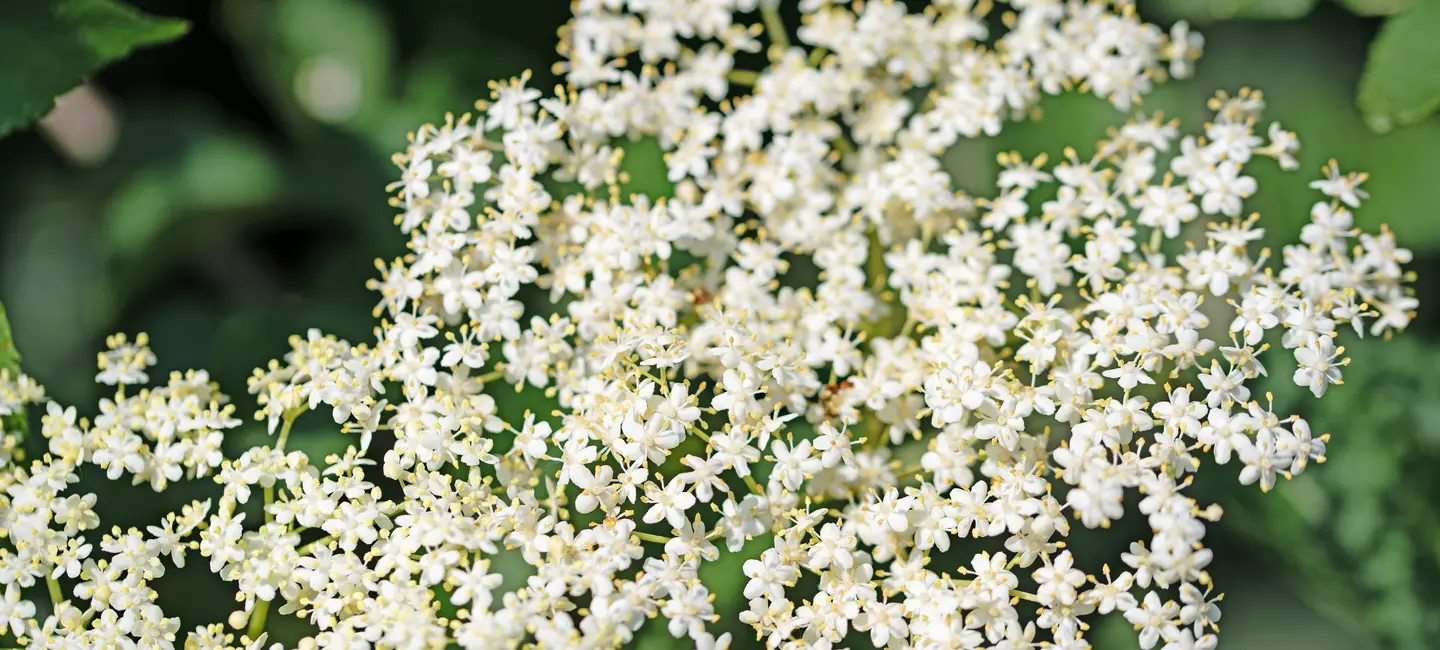
Elderflower is the flower of the elder tree. An extract of the flower is used to make medicine.
Elderflower is used for common cold, flu (influenza), swelling (inflammation) of the nasal cavity and sinuses (rhinosinusitis), and many other conditions, but there is no good scientific evidence to support these uses.
In foods and beverages, elderflower is used as a flavoring component.
In manufacturing, elderflower extracts are used in perfumes.
Is It Effective?
NatMed Pro rates effectiveness based on scientific evidence according to the following scale: Effective, Likely Effective, Possibly Effective, Possibly Ineffective, Likely Ineffective, Ineffective, and Insufficient Evidence to Rate.
- Common cold.
- Constipation.
- Cough.
- Diabetes.
- Flu (influenza).
- Swelling (inflammation) of the main airways in the lung (bronchitis).
- Swelling (inflammation) of the nasal cavity and sinuses (rhinosinusitis).
- Swelling (inflammation) of the voice box (laryngitis).
- Minor bleeding.
- Rheumatoid arthritis (RA).
- Sore eyes.
- Other conditions.
More evidence is needed to rate the effectiveness of elderflower for these uses.
Is it Safe?
There isn't enough reliable information available to know how elderflower might work.
When taken by mouth: Elderflower is LIKELY SAFE when used in amounts found in foods. Elderflower is POSSIBLY SAFE for most people when used short-term as medicine, or in small amounts as part of a combination product containing elderflower, sorrel, gentian root, verbena, and cowslip flower (SinuComp, Sinupret). The combination product can cause digestive system upset and sometimes allergic skin rash.
Elderflower is POSSIBLY UNSAFE when used in excessive amounts. Some parts of the elder tree contain a cyanide-producing chemical which can cause nausea, vomiting, and diarrhea. Cooking removes this chemical.
Special Precautions & Warnings:
Pregnancy and breast-feeding: There isn't enough reliable information to know if elderflower is safe to use when pregnant or breast-feeding. Stay on the safe side and avoid use.
Diabetes: There is a concern that elderflower might lower blood sugar levels. If taken with diabetes medications, it might make blood sugar levels go too low. If you have diabetes and use elderflower, be sure to monitor your blood sugar levels carefully.
Surgery: Elderflower might lower blood sugar levels. There is some concern that it might interfere with blood sugar control during and after surgery. Stop using elderflower at least 2 weeks before a scheduled surgery.
Medications for diabetes (Antidiabetes drugs)
Interaction Rating=Moderate Be cautious with this combination.
Elderflower might decrease blood sugar levels. Diabetes medications are also used to lower blood sugar. Taking elderflower along with diabetes medications might cause your blood sugar to drop too low. Monitor your blood sugar closely. The dose of your diabetes medication might need to be changed.
Some medications used for diabetes include glimepiride (Amaryl), glyburide (DiaBeta, Glynase PresTab, Micronase), insulin, pioglitazone (Actos), rosiglitazone (Avandia), chlorpropamide (Diabinese), glipizide (Glucotrol), tolbutamide (Orinase), and others.
Herbs and supplements that might lower blood sugar: Elderflower might lower blood sugar levels. Using it along with other natural products that have the same effect might cause blood sugar levels to drop too low. Some of these products include alpha-lipoic acid, bitter melon, chromium, devil's claw, fenugreek, garlic, guar gum, horse chestnut, Panax ginseng, psyllium, Siberian ginseng, and others.
There are no known interactions with foods.
The appropriate dose of elderflower depends on several factors such as the user's age, health, and several other conditions. At this time there is not enough scientific information to determine an appropriate range of doses for elderflower. Keep in mind that natural products are not always necessarily safe and dosages can be important. Be sure to follow relevant directions on product labels and consult your pharmacist or physician or other healthcare professional before using.
Arbre de Judas, Black-Berried Alder, Black Elder, Boor Tree, Bountry, Common Elder, Ellanwood, Ellhorn, European Alder, European Black Elder, European Black Elderflower, European Elderflower, European Elder Flower, Fleur de Sureau, Fleur de Sureau Noir, Flor de Saúco, Flos Sambuci, Hautbois, Haut Bois, Sambuc, Sambucus, Sambucus Flos, Sambucus Nigra Flos, Sambucus nigra, Seuillon, Sureau Commun, Sureau Noir, Sussier, Sweet Elder.
Information on this website is for informational use only and is not intended to replace professional medical advice, diagnosis, or treatment. While evidence-based, it is not guaranteed to be error-free and is not intended to meet any particular user’s needs or requirements or to cover all possible uses, safety concerns, interactions, outcomes, or adverse effects. Always check with your doctor or other medical professional before making healthcare decisions (including taking any medication) and do not delay or disregard seeking medical advice or treatment based on any information displayed on this website.
© TRC Healthcare 2024. All rights reserved. Use and/or distribution is permitted only pursuant to a valid license or other permission from TRC Healthcare.
